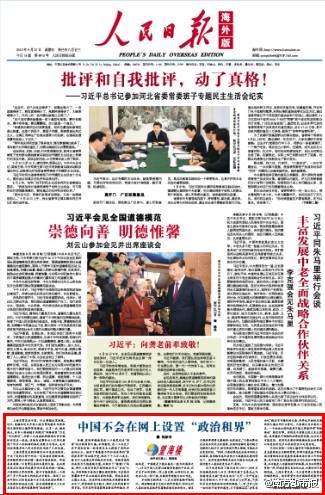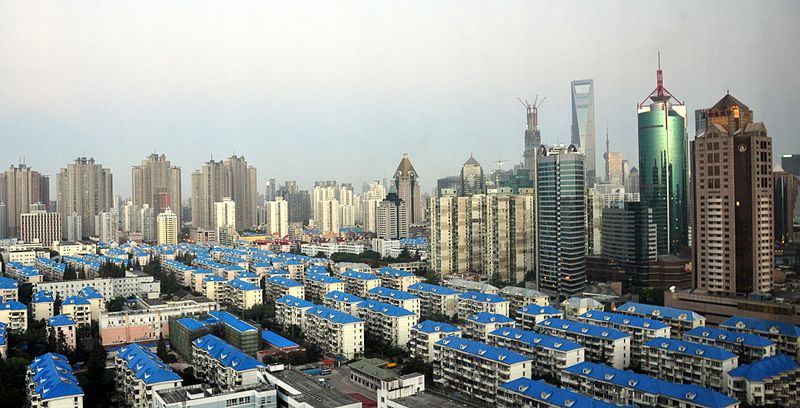Overseas media reports [2] about new “free Internet zones” in Shanghai and Shenzhen have hit a nerve for both Chinese authorities and citizens alike. After state officials announced that businesses in the two cities would soon have access to the open global Internet, without facing the many restrictions placed on national networks in China, foreign commentators were swift to interpret the news as a sign of political liberalization. In what looked like a response to the excitement September 27 front-page article in China Daily's overseas edition stressed that there would be no “concession” in future free trade zones.
Since the beginning of Deng Xiaoping's era in 1970s, major political and economic development experiments in China have been marked by the setting up of “special districts” such as Special Economic Zones, Free Import and Export Zones, and Economic and Technological Development Zones. The special regions seem to contradict certain tenets of communism, but Deng is highly praised as the engineer behind China's economic success for the past few decades.
The latest development under the new leadership of Xi Jinping, who had visited Shenzhen to pay tribute to Deng's innovative idea of “special economic district”, is the establishment of “Shanghai Free Trade Zone [3]” to facilitate China for entering the global trade and financial market through a set of liberalization policy, including a convertible yuan and liberalized interest rates. It could take up to three years for the city to set up the infrastructure of the Free Trade Zone.
The “free trade zone” is premised on the idea that international financial centers require soft infrastructure including rule of law, a free press and a free flow of information – all conditions that have given Hong Kong advantages [4] when compared to any other mainland Chinese cities in the global economy. The scenario begs the question: can any international financial center operate without free access to information?
This is not the first time China has proposed creating a filter-free Internet zone. In 2010, a number of prominent Internet entrepreneurs, including Pony Ma, president and CEO of social media company Tencent, suggested [5][zh] that Shenzhen should become an Internet Special Region where people are connected with the global network. Their request was ignored but in the process of developing the Qianhai Economic Zone, unrestricted Internet access has been put on the agenda. In 2011, mainland Chinese newspaper Southern Weekend revealed [6] that the Chongqing city planned to build a “Cloud Special Administrative Region” and to attract foreign cloud hosting companies. The cloud data center would be isolated from the mainland network via a dedicated fiber optic cable. This tailor-made arrangement for foreign companies left a bitter taste in the mouths of many Chinese netizens. News organizations reporting on the computing park were forced to withdraw [7] [zh] their articles as the Free Internet Zone rapidly became a sensitive topic. However, the Cloud Special Administrative Region” project has not been disrupted.

A commentary calling free Internet zone “a concession”, appears on the front page of China Daily on September 27.
With this recent announcement, Chinese government sources [8] told Hong Kong-based South China Morning Post that the Internet would be unblocked and foreign Internet Service Providers would be welcomed in the Shanghai free trade zone on September 24. Two days later, Reuters reported [9] that the Qianhai Economic Zone in Shenzhen would also have free Internet access.
As news about unblocked Internet access in future Shanghai and Shenzhen Free Trade Zones spread online, state-controlled media quickly denied the reports. A China Daily front page story written by [10] [zh] Mei Xinyu, a researcher from the Ministry of Commerce, described free Internet access in the special districts as “concessions [11]“, territories that conceded to foreign power by the Imperial Qing Government under unequal treaties after defeating in battles.
The article stresses that the Shanghai Free Trade Zone will be strictly economic, meaning there will be no concession, and therefore no substantial change in Internet openness. The writer praises the China Great Firewall as an effective tool to uphold international justice, noting it has prevented “bloody conflicts” such as the Arab Spring from taking place in China. He argues that the reality of the Internet is far from being a “freedom land” as revealed by the Snowden's revelation of US spying of online communication and that the Great Firewall has thus defended China's sovereignty.
The conceptual confusion in the piece highlights the persisting conflict between the need for economic transformation and the desire for ideological control to sustain the ruling power of China's single-party system. Evidently, it has translated to rounds and rounds of ideological battles [12] both within and outside the ruling party — just when online commentary began to spread, the State Council Information Office issued [13] a rule prohibiting websites from re-posting the People’s Daily (overseas edition) article “China Will Not Establish Online ‘Political Concession'” and demanded previous posts be removed.
We have yet to see how the State Council will handle the ideological framework that dichotomizes “free internet access” and “political concession”. Internet users in China expect equality in information access across the country, but in an interview with helanonline.cn [14] [zh] prominent Chinese blogger Michael Anti said he believes that freedom of information will be restricted in the “free” zone and such regional freedom will not have much impact on overall censorship practices in China.
